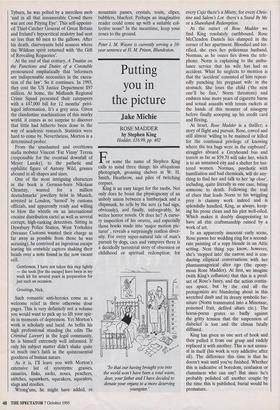All grasses
are flesh
Peter J. M. Wayne
SUPERGRASSES AND INFORMERS: AN INFORMAL HISTORY OF UNDERCOVER POLICE WORK by James Morton Little, Brown, £16.99, pp. 347 I got this great big long needle which was used for sewing mailbags. When he came in and was locked up, I crept up to his cell. He said 'Who is it?' I said 'It's me, look through the spyhole,' and as he did I stabbed the needle through.
Mad' Frankie Fraser was never one to tolerate a grass. That particular one, to whom he refers so chillingly in his mem- oirs, got off comparatively lightly. Some have been killed outright. Others simply disappear. Despite the occasional tabloid tale of informers enjoying nude bathing sessions (Bertie Smalls with a female offi- cer) or the comforts of room service in a suite at a four-star hotel, the supergrass's lot is not a happy one.
Take David Smith, for example. — a common enough name if it was his own. In 1977 Smith was arrested for a wages snatch in which an old man had been ruthlessly squirted with ammonia. After a tearful scene in the interview room, he confessed to his involvement in this and scores of other crimes. Smith spent 15 months in Finchley police station making statements against 69 other people. In the end, notwithstanding Judge Michael Argyle's opinion that he was one of 'the most dan- gerous criminals in British history', he was sentenced to five years' imprisonment for a total of SO robberies.
When he'd served that sentence, Smith had the temerity to go out, rob, and get caught again. This time, though, there was no more redemptive warbling. Within days of his re-arrest, he took his own life by cut- ting his throat.
There are many similarly disquieting scenarios. I think I preferred (if that's the right word) the historical sections of Morton's gloom-ridden book, where at least one felt at some remove from the treacherous protagonists and their dastard- ly misdeeds.
When, in 1725, the infamous double- dealer Jonathan Wild was executed at Tyburn, he was pelted by a merciless mob 'and in all that innumerable Crowd there was not one Pitying Eye'. This self-appoint- ed Thief-Catcher General of Great Britain and Ireland's hypocritical zealotry had sent no less than 60 men to the gallows. After his death, clairvoyants held seances where the Wildean spirit returned with 'the Gift of Revealing Rogueries'.
At the end of that century, A Treatise on the Functions and Duties of a Constable pronounced emphatically that 'informers are indispensable necessities in the execu- tion of the law'. So it continues. In 1993, they cost the US Justice Department $97 million. At home, the Midlands Regional Crime Squad presented their ratepayers with a £.47,000 bill for 12 months' privi- leged information. It's a grey area. Given the clandestine machinations of this murky world, it comes as no surprise to discover that little had hitherto been done in the way of academic research. Statistics were hard to come by. Nevertheless, Morton is a determined prober.
From the unashamed and overblown mafia mobster Vincent 'Fat Vinny' Teresa (responsible for the eventual downfall of Meyer Lansky), to the pathetic and syphilitic figure of Antony Wild, grasses abound in all shapes and sizes.
One of the most intriguing characters in the book is German-born Nikolaus Chrastny, wanted for a million deutschmarks' jewellery heist in Munich, arrested in London, 'turned' by customs officials, and apparently ready and willing to blow the whistle on an international cocaine distribution cartel as well as several corrupt, high-ranking detectives. Sitting in Dewsbury Police Station, West Yorkshire (because Customs wanted their charge as far away as possible from those he was accusing), he contrived an ingenious escape leaving his erstwhile captors shaking their heads over a note found in the now vacant cell.
Gentlemen, I have not taken this step lightly — the tools [for the escape] have been in my wash kit for several years in preparation for just such an occasion.
Greetings, Nick.
Such romantic anti-heroics come as a welcome relief in these otherwise dour pages. This is very definitely not a volume you would want to pick up to lift your spir- its in moments of depression. Yet Morton's work is scholarly and lucid. As befits his high professional standing (he edits The Criminal Lawyer) in the legal community, he is himself extremely well informed. If only his subject matter didn't shake quite so much one's faith in the quintessential goodness of human nature.
As it is, I'll leave you with Morton's extensive list of synonyms: grasses, canaries, finks, narks, noses, peachers, snitches, squawkers, squeakers, squealers, stags and stoolies.
Wrong'uns, he might have added or mountain passes, crystals, touts, dipes, bubblers, bluefeet. Perhaps an imaginative reader could come up with a suitable col- lective noun? In the meantime, keep your noses to the ground.
Peter .1. M Wayne is currentb) serving a 10- year sentence at H. M. Prison, Blundeston.











































































 Previous page
Previous page